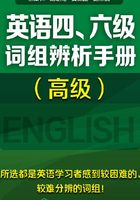
46 barge in; barge in on; barge into; break in; chip in; cut in; edge in; get in; get in a word; put in; cut in on; cut into
● 以上词组均意为“插嘴”,其中的in为副词,on; into为介词。
● barge in或barge in on或barge into,多指不礼貌地插嘴,插嘴内容多用with连结。如:Don’t barge into a conversation.(不要插嘴。)The girl barged in on our meeting.(这女孩打断了我的会议。)There was no end for you to barge in with your remarks.(根本无需你来插嘴。)Let him finish his word. Don’t keep barging in. (让他把话讲完,不要老是没礼貌地打断他。)
● break in与barge in用法差不多,但只作一般的“插嘴”之意,可用被动语态。如:Don’t break in our conversation.(不要打断我们的谈话。)Listen carefully; don’t break in with your remarks.(注意听,别插嘴发表评论。)May I break in to ask a question?(我可以插嘴提个问题吗?)May I break in to tell you that everything is ready?(对不起,我想插一句,一切已准备就绪。)The meeting was broken in upon by the arrival of a group of petitioners.(他们的会议被一群前来请愿的人打断了。)The sudden hoot of a whistle broke into my thoughts.(突然响起的汽笛打断了我的思路。)
● chip in用法和意思同barge in,两者可互换,只是搭配上chip in后只跟with。如:The conversation was very pleasant until our talkative neighbour chipped in.(我们的交谈一直很愉快,后来被多嘴多舌的邻居插话破坏了我的兴趣。)She had little luck with her attempts to chip in, though she contributed some lively aside.(尽管她在旁边说了些生动的离题的话,但是,真不巧,她插不上嘴。)In the discussion everyone chipped in with his opinion.(在讨论中大家七嘴八舌,各抒己见。)“He shouldn’t be so careless,”Robert chipped indignantly.(“他不该这样粗心大意”,罗伯特气愤地插了一句。)
● cut in属常用词组,用于各种场合。cut in on后接谈话和讨论之类的词语,这时可与cut into互换,但cut in on后接人时不与out into互换,cut in之后也可用with连结插话内容。如:The moment I began to speak, he cut in.(我一开始讲话,他就插嘴。)Don’t cut in when she is talking.(她讲话时你不要插嘴。)While Mary and Jim were talking on the porch, Mary’s little brother cut in on them and began to tell about his fishing trip.(玛丽和吉姆在走廊谈话时,玛丽的弟弟插嘴谈论他钓鱼的事儿。)Don’t cut in on [cut into] other people’s conversation.(别人谈话时别去插嘴。)When they were talking, Tom cut in with a question.(他们正在谈话,汤姆插嘴问了个问题。)“May I join you?”a loud voice cut in.(“可以参加你们的活动吗?”一个人大声打断了我们的谈话。)
● edge in指在别人高声谈论中“插话”,少用被动语态。如:The noise at the party was so loud that I was hardly able to edge in a remark at all.(宴会是如此喧闹,我根本无法插话。)He had difficulty edging in a word of his own.(他难以说出自己的心里话。)She would scarcely edge in a word.(她几乎插不进一句话。)
● get in与get in a word是常用词组,一般不用被动语态,两者可互换,但常用get a word in形式。如:He always gets in between the other two people.(他总是在另外两个人谈话时插话。)She always gets her favourite story in when she makes a speech.(她在发言时总是插进去她最得意的事。)The little boy listened to us and finally got a word in.(这个男孩一直听我们谈话,后来总算找到机会插上几句。)May I get a word in?(我可以插句话吗?)Mary talked so fast that Jack couldn’t get a word in edgeways.(玛丽讲得太快,杰克简直插不上嘴。)Before I could get in a word he had measured me and was giving orders for evening suits.(我还没来得及插一句嘴,他已把我的尺码量好了,并且吩咐给我做晚礼服。)
● put in是一般口语,多用主动语态。如:We all listened very attentively without one putting in.(我们大家都很注意地听着,没有一个人插话。)“Don’t forget us,”she put in.(“别忘了我们,”她插话说。)In his letters, he always puts in some amusing remark about his neighbours’ activities.(她经常在信中加一些关于他邻居活动的笑话。)“But I object!”he put in, suddenly and unexpectedly.(“但是我反对!”他突然而意外地插了一句。)